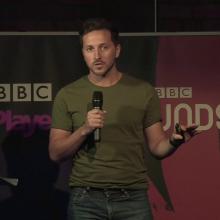Summary
Disclaimer: This summary has been generated by AI. It is experimental, and feedback is welcomed. Please reach out to info@qconlondon.com with any comments or concerns.
Title: Architecture in the Lead: Scaling Today, Shaping Tomorrow
Speakers: Matthew Clark and Ian Arundale
Overview: The presentation discusses how architecture can lead change within organizations by driving reliability, security, and growth at scale. The BBC's digital architecture handling over 100 million visitors annually is used as a case study.
Main Points:
- Time Travel Exercise: An analogy used to reflect on past experiences and decisions shaping current architecture practices.
- Architecture Challenges:
- Handling large-scale traffic, exemplified by UK election night with over 40 million visitors.
- Addressing security as a primary focus, highlighting the threats from nation-states and hackers.
- The importance of resilience in critical moments, showcased by past election night challenges and learnings.
- Architecture Strategies:
- Using the cloud for elasticity and resilience, with examples of caching, serverless architecture, and content distribution networks.
- Implementing security through proactive threat modeling and integrating it early into the development process.
Non-Functional Requirements (NFRs): Emphasizes the importance of NFRs in architecture, including elasticity, resilience, and security, and how they vary depending on the organizational context.
Conclusion: The speakers conclude by stressing the role of architects as leaders who must adapt, influence, and inspire to implement effective architectural solutions.
This is the end of the AI-generated content.
Abstract
The BBC’s websites and apps handled well over 100 million visitors in 2024, with 40 million people arriving on UK Election night alone. That’s a lot of scale for an architecture to handle, but it’s just the beginning. True success comes not just from scaling to meet today’s demand, but from shaping what comes next. In this talk, we’ll explore how architecture can lead change in an organisation, driving reliability, security, and growth at scale. We’ll look at approaches to influence decisions, set the technical vision, and guide organizations to ride the wave of technological change, continuing to innovate long after the first 100 million arrive.
Speaker

Matthew Clark
Head Of Architecture for the @BBC's Digital Products, 25+ Years Developing Online Software
Matthew Clark is Head of Architecture for many of the BBC’s online products. He’s been at the BBC for over 10 years, and has been involved in multiple projects such as covering the London 2012 Olympics, and getting BBC iPlayer working on the International Space Station. His passion is technical strategy – understanding how new technologies offer phenomenal opportunities to solve problems, move faster, create amazing new experiences, and make the world a better place.
Find Matthew Clark at:
Speaker

Ian Arundale
Lead Architect for the @BBC's Digital Products, 20+ Years in Software Engineering
Ian Arundale is a Lead Architect shaping the future of the BBC's digital products. With 20+ years of experience in software development - from building the first iPlayer for TVs to migrating broadcast-critical systems to the cloud and driving large-scale digital transformation he has played a pivotal role in transformative projects - all while delivering major international events to an audience of 100M+.
As a senior technical leader, Ian is passionate about simplifying complex systems and evolving technical architecture through collaboration, shared understanding, and a people-centric approach. He champions developer experience and testability, ensuring teams can innovate at scale while maintaining resilience and adaptability.






